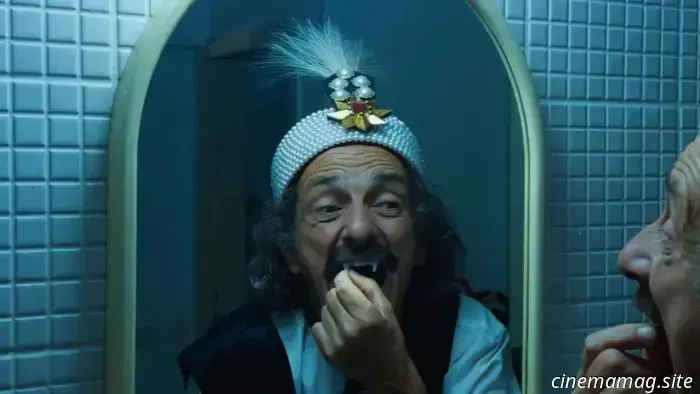
Locarno Review: Radu Jude’s Dracula is a Wild and Excessive Satire
Radu Jude is regarded as one of the exceptional filmmakers of the decade. His newest work, Dracula, is superficially a satire on Vlad the Impaler––the most renowned Romanian, who appears in various forms throughout the film––but its primary target is AI learning models. The film revels in the technology's potential for crudeness and ignorance while highlighting concerns about its broader capabilities. Consequently, Jude has created a deliberately crude and childish film, though I’m not entirely convinced it’s humorous enough to avoid such labels. A bit too self-satisfied and self-indulgent, Dracula takes a lengthy 186 minutes to convey its message; while fans of the director’s more absurd tendencies might find their rhythm in it, I found it challenging to view it favorably.
As someone who has admired Jude’s work since I Do Not Care If We Go Down in History as Barbarians, this reaction is unexpected. He has successfully functioned as a kind of art-cinema oracle for the TikTok age, yet Dracula only occasionally captures its intended target. The Romanian director won the Golden Bear for Bad Luck Banging or Looney Porn in 2020, a pleasant surprise then, and surpassed it with Do Not Expect Too Much from the End of the World, which most reputable sources considered among the best of that year. After enjoying his recent film, Kontinental ‘25, at the Berlin Film Festival this year, I began to question how long Jude could maintain such high standards. I suppose Dracula serves as a reminder that he can balance things out a bit.
This film exemplifies Jude’s scattershot approach. Throughout various vignettes, each adorned with delightfully garish AI imagery––including one featuring what resembles a Daniel Day-Lewis Vlad proclaiming “suck my cock” in Romanian, some visually stunning porn-inspired sequences midway, and a copyright-stealing homage to Coppola’s vampire––Jude provides a few plot threads to cling to. One follows a group at a tourist variety show featuring Dracula (played by Jude regular Gabriel Spahiu), his tattooed companion Vampira (Oana Maria Zaharia), and a master of ceremonies (Adonis Tanța from Kontinental ‘25), as they engage in all sorts of raunchy antics. Later, tourists are armed with stakes to pursue Vlad and Vampira around the city. The interactions between Spahiu and Zaharia while waiting to be captured are among the most enjoyable parts of an opening hour that moves quickly.
Dracula loses significant momentum when Jude indulges in lengthy digressions. The strongest segment adapts Romanian author Nicolae Velea’s romantic novel Just So but takes a full 30 minutes to deliver one (granted) humorous punchline. Another segment features Vlad returning to his birthplace (now a museum) where a brief history of his crimes is recounted. The most tedious portion, which presents a more conventional Dracula tale from the perspective of a traveling writer, is mostly delivered in a TV-studio format reminiscent of previous Jude works like Uppercase Print. Tanța reprises his role as the writer, whose remarkable energy provided a nice contrast to Eszter Tompa’s demeanor in Kontinental ‘25, but begins to dominate the film here, with Jude continuously relying on him for lines directed at the audience.
One of the most intriguing among the approximately 14 segments is titled “Das Kapital,” featuring Vlad running a sort of boiler-room gaming company eager to profit from in-app purchases. Arriving in the final third, it brings a plethora of excitement: fire and action, with both Ilinca Manolache (the impressive star of Do Not Expect) and Tanța appearing as a sub-coded C-3PO figure. As with the rest, the humor leans towards the obvious, but this sequence succeeds. Conversely, a later segment, during which my attention had admittedly begun to wane, features a man tending to a cornfield that starts yielding dildos. It will be interesting to see if Jude’s planned Frankenstein film follows a similarly chaotic path, especially considering he intends to include an Oscar-nominated Avenger.
The recurring element Jude revisits involves a fourth-wall-breaking screenwriter (again played by Tanța) who we see encouraging an AI learning model to generate scripts for Dracula’s vignettes. Whether or not Jude actually utilizes these texts is almost secondary––the film seems to convey the message, “Don’t worry, no AI will ever create Andrei Rublev, so just enjoy the journey.” The director's charming curiosity about new media has distinguished him from his contemporaries in recent years, but many of the jokes felt unusually broad: for instance, the scene in which Vlad suffers a toothache and visits a dentist named Dr. Caligari. I wish I could say that nobody in my screening found that amusing. Perhaps I’m in the minority. Jude’s intelligence remains impressive, and Dracula, for better or worse, leaves the audience with
Other articles
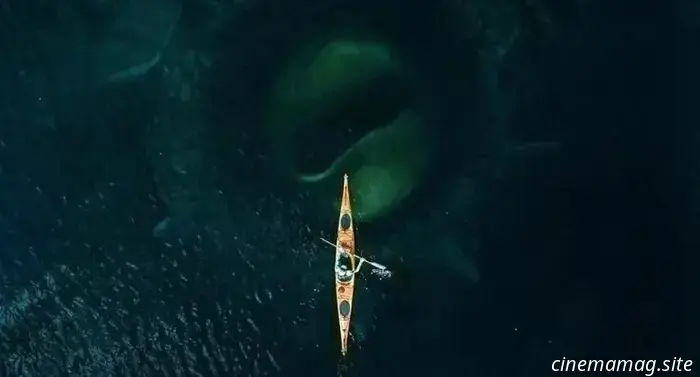 The creature feature "Kraken" reveals its trailer and poster.
A trailer has been released online for the Norwegian creature feature Kraken, directed by Pål Øie and Sjur Aarthun. The thriller centers on a marine biologist who uncovers that experiments at a remote fish farm have disrupted the local ecosystem, leading to the awakening of a mythical creature in one of Norway's deepest fjords. The cast features Sara Khorami, Mikkel Bratt Silset, Ingvild Holthe Bygdnes, […]
The creature feature "Kraken" reveals its trailer and poster.
A trailer has been released online for the Norwegian creature feature Kraken, directed by Pål Øie and Sjur Aarthun. The thriller centers on a marine biologist who uncovers that experiments at a remote fish farm have disrupted the local ecosystem, leading to the awakening of a mythical creature in one of Norway's deepest fjords. The cast features Sara Khorami, Mikkel Bratt Silset, Ingvild Holthe Bygdnes, […]
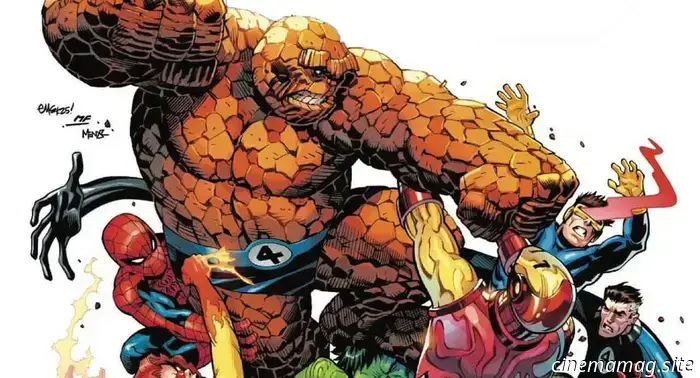 Marvel All-On-One #1 - Comic Book Teaser
First published on August 17, 2025. Revised on August 18, 2025. This week, The Thing takes on the entire Marvel Universe in the release of Marvel All-On-One #1, and you can view a sneak preview of the issue below with the official preview… It's a 50-page epic told completely in splash pages! Ben Grimm, also known as The Thing: He’s […]
Marvel All-On-One #1 - Comic Book Teaser
First published on August 17, 2025. Revised on August 18, 2025. This week, The Thing takes on the entire Marvel Universe in the release of Marvel All-On-One #1, and you can view a sneak preview of the issue below with the official preview… It's a 50-page epic told completely in splash pages! Ben Grimm, also known as The Thing: He’s […]
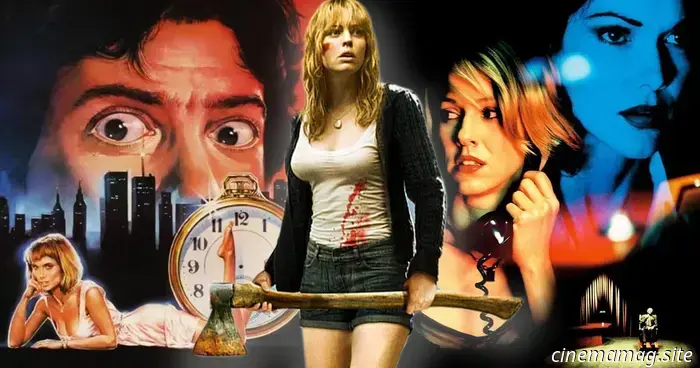 10 Fantastic Movies in the Style of The Twilight Zone to Add to Your Watch List
Casey Chong offers a curated list of films reminiscent of the Twilight Zone... The Twilight Zone started as an anthology TV series that aired from 1959 to 1964, later expanding into additional series in 1985, 2002, and 2019, as well as radio dramas, comic books, graphic novels, and, notably, the feature film Twilight Zone: […] released in 1983.
10 Fantastic Movies in the Style of The Twilight Zone to Add to Your Watch List
Casey Chong offers a curated list of films reminiscent of the Twilight Zone... The Twilight Zone started as an anthology TV series that aired from 1959 to 1964, later expanding into additional series in 1985, 2002, and 2019, as well as radio dramas, comic books, graphic novels, and, notably, the feature film Twilight Zone: […] released in 1983.
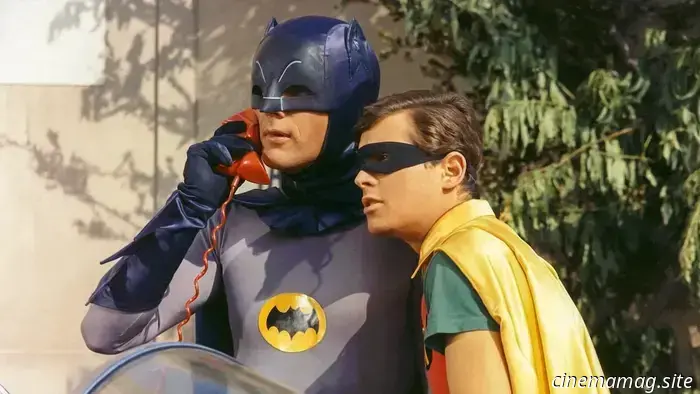 7 Unusual Aspects of the Batman and Robin Dynamic
Batman and Robin share an unusual and potentially illicit relationship. Let’s examine it more closely.
7 Unusual Aspects of the Batman and Robin Dynamic
Batman and Robin share an unusual and potentially illicit relationship. Let’s examine it more closely.
.jpg) Rest in peace, Terence Stamp (1938 - 2025)
It is with a heavy heart that we share the news this afternoon of the passing of the iconic English actor Terence Stamp, who died today at the age of 87. His family released a statement saying, “He leaves behind an impressive body of work, both in acting and writing, which will keep inspiring and resonating with people [...]”
Rest in peace, Terence Stamp (1938 - 2025)
It is with a heavy heart that we share the news this afternoon of the passing of the iconic English actor Terence Stamp, who died today at the age of 87. His family released a statement saying, “He leaves behind an impressive body of work, both in acting and writing, which will keep inspiring and resonating with people [...]”
 Naughty Video Games from the Past
Andrew Newton examines a range of risqué video games from the past… In February, I noted that we would explore the shady aspects of video games from the old home computers. As promised, after extensive research (ha!), and with plenty of unusual […]
Naughty Video Games from the Past
Andrew Newton examines a range of risqué video games from the past… In February, I noted that we would explore the shady aspects of video games from the old home computers. As promised, after extensive research (ha!), and with plenty of unusual […]
Locarno Review: Radu Jude’s Dracula is a Wild and Excessive Satire
Radu Jude is considered one of the outstanding filmmakers of the decade. His newest work, Dracula, appears to be a satire on Vlad The Impaler––the most renowned Romanian––who is featured in various forms throughout the film. However, the primary focus is on AI learning models. It is a film that embraces the technology's capacity for crudeness and foolishness.
